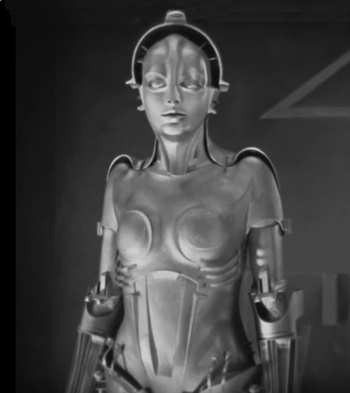You, Robot
April 10, 2017
When I was a
child, long before the
Internet had been
invented, the only sources of daily distraction were
television and the
newspaper. Television in those days was
broadcast, only, so daytime viewing was dominated by "
soap operas." That left me with the
book that I was currently reading, typically
science fiction, or the newspaper. In our
middle class suburban household, the newspaper was the local
rag, and not
The New York Times.
Since "
all the news that's fit to print" doesn't take that many pages, the local newspaper had quite a few
filler articles. In one of these I learned about the technical name for the
fear of the number thirteen; namely,
triskaidekaphobia. Such an
irrational fear is called a
phobia, from the
Greek word, φοβος (phobos, fear).
Scientists have usurped the term, phobia, for other purposes, as in
hydrophobia, the property of being repelled by
water.

Friday the 13th.
Some people have a fear, paraskavedekatriaphobia, of Fridays that fall on the 13th day of a month.
Such a day occurs at least once each year, and up to three times a year. The next Friday the 13th will be October 13, 2017.
(Linux Oxygen Project icon, modified using Inkscape.)
Triskaidekaphobia is a
compound word that combines phobia with three other Greek words, τρις (three), και (and), and δεκα (ten); that is, the Greek way of saying thirteen. It's easy to coin a new phobia by combining a Greek
prefix with -phobia. This was interesting to me, a child who was being
classically educated and didn't have
hellenologophobia, the fear of Greek language terms.
Wikipedia has an extensive list of
phobias that includes such common phobias as
• Arachnophobia Fear of spiders, scorpions, etc.
• Ophidiophobia Fear of snakes.
• Acrophobia Fear of heights.
• Agoraphobia Fear of open places.
• Cynophobia Fear of dogs.
• Claustrophobia Fear of enclosed spaces.
There are also some interesting, but uncommon, phobias.
• Globophobia Fear of balloons.
• Pupaphobia Fear of puppets.
• Coulrophobia Fear of clowns.
While coulrophobia is not a
medically-recognized phobia, you might think that this assessment is shortsighted after viewing
Killer Klowns from Outer Space (1988,
Stephen Chiodo, Director).[1]
As expected, there are a few phobias relating to the
STEM fields. First, there's
numerophobia (also called arithmophobia). This is technically a fear of
numbers, but it's generally considered to be "
math phobia."
Chemophobia is a fear of
chemicals, or
chemistry. People with an aversion to
technology might suffer from
neophobia, the fear of anything new. Why stop there, when you can have
panphobia, also called pantophobia, the fear of everything,[2] which would also encompass
hippopotomonstrosesquipedaliophobia, the fear of long words.
One increasingly common phobia in our
modern age is
technophobia, the fear of advanced technology and its devices. Technophobia has deep roots, having started in the
industrial revolution, when
machines, such as
weaving machines, started to replace skilled
weavers. The
Luddites, a group of
19th century anti-technology
textile workers in
England, took to smashing machines.
Neo-Luddite is used today as a
derogatory term to describe technology skeptics.
The
history of technophobia is easily tracked through
novels and other
media, one major example of which would be
Mary Shelley's Frankenstein. In
cinema,
Fritz Lang's Metropolis, now available on
YouTube,[3] shows a world in which people are
slaves who run machinery owned by an
upper class. A recent cinema example is the series of
Terminator movies that pit
artificially intelligent machines against mankind.

Stepford wife, vers. 1.0.
In Fritz Lang's Metropolis, the ultimate fate of men tending to the machines of the upper class was to become machines, themselves.
(Still image from a YouTube video.)
Some technophobic groups, such as the
Amish (see photo) resist technology as being contrary to
religious principles. As discovered in the 2015
Chapman Survey of American Fears, some individuals who use technology actually fear it.[4] This survey of about 1,500 adults placed the fear of
tracking of personal data at more than double the
fear of death.[4]
Christopher Bader, a
professor of
sociology at
Chapman University and a study
co-author, remarked that fear of technology is high since the highest levels of fear are for things on which we're dependent, but have no control.[4]
.jpg)
One horsepower.
Amish sedans, such as this, can be seen on the rural roads of Lancaster County, Pennsylvania, even today.
(Wikimedia Commons photo by Art Anderson.)
One growing problem is the rise of
automation and the
concomitant problem of job displacement. I discussed some aspects of this in a
previous article (The Future of Work, March 3, 2016). A recent
Baylor University study of data from Wave 2 of the Chapman Survey of American Fears of 1,541 participants shows that more than a third of those polled have a greater fear that technology will lead to
job loss than they
fear public speaking,
romantic rejection, and
police brutality.[5-6]
It was found that technophobes, who are a significant portion of
Americans, are more likely than non-technophobes to report having
anxiety-related
mental health issues and to fear
financial insecurity.[5]
women,
non-whites and the less
educated,
traditionally marginalized groups, report being most fearful of technology.[6] Says,
Paul McClure, a
sociologist at
Baylor University who published the study in
Social Science Computer Review,
"If you're afraid of losing your job to a robot, you're not alone... This is a real concern among a substantial portion of the American population. They are not simply a subgroup of generally fearful people... "People in certain occupations may legitimately fear losing their jobs to robots and software that can work for cheaper and for longer hours than any human."[6]
Previous
research has linked the unemployed, and employees who have little job security, with poorer mental health,
heart disease and increased
mortality.[6] Technophobes, who were found to be 37% of those surveyed, are three times more likely to fear unemployment compared to others, and they were nearly three times more likely to be worried about their future financial security.[6] Technophobes almost uniformly can't stop or control worrying, and about three-quarters of technophobes have a feeling of
dread.[6]
Experts have said that the rate of worker displacement by robots and artificial intelligence will increase in the next several years, particularly in routine job areas.[6] These would include such occupations as
warehouse workers,
truck drivers,
loan officers and
paralegals. Notably safe would be
manual laborers in non-routine jobs and workers in
creative fields.[6] Says McClure, "Regardless of whether technology might lead to certain people's jobs becoming obsolete, the fear itself is real."[6]
Some funding for the Chapman Survey of American Fears was provided by the
John Templeton Foundation.[6]
References:
- Killer Klowns from Outer Space (1988, Stephen Chiodo, Director) on the Internet Movie Database.
- Lucy as a Psychiatrist, Charlie Brown Christmas, YouTube Video, February 6, 2010.
- Metropolis on YouTube; Another version on YouTube.
- Cari Romm, "Americans Are More Afraid of Robots Than Death," The Atlantic, October 16, 2015.
- Paul K. McClure, "'You're Fired,' Says the Robot," Social Science Computer Review, Advanced Publication, March 20 2017.
- People Afraid of Robots Are Much More Likely to Fear Losing Their Jobs and Suffer Anxiety, Baylor Study Finds, Baylor University Press Release, March 21, 2017.
Permanent Link to this article
Linked Keywords: Child; Internet; invention; invented; television; newspaper; broadcasting; broadcast; soap opera; book; science fiction; middle class; suburb; suburban; household; tabloid journalism; rag; The New York Times; all the news that's fit to print; filler article; unlucky 13; fear of the number thirteen; triskaidekaphobia; irrationality; irrational; fear; phobia; Greek language; Greek word; scientist; hydrophobe; hydrophobia; water; Friday the 13th; paraskavedekatriaphobia; Friday; month; year; Linux; Oxygen Project; icon; Inkscape; compound word; prefix; classics; classically educated; Wikipedia; List of phobias; Arachnophobia; spider; scorpion; Ophidiophobia; snake; Acrophobia; Agoraphobia; Cynophobia; dog; Claustrophobia; Globophobia; balloon; Pupaphobia; puppet; Coulrophobia; clown; ICD-10; medically-recognized phobia; Killer Klowns from Outer Space; Stephen Chiodo; STEM fields; numerophobia; number; mathematical anxiety; math phobia; Chemophobia; chemical compound; chemical; chemistry; technology; neophobia; panphobia; hippopotomonstrosesquipedaliophobia; modern history; modern age; technophobia; industrial revolution; machine; Jacquard loom; weaving machine; weaving; weaver; Luddite; 19th century; textile; England; Neo-Luddism; Neo-Luddite; pejorative; derogatory term; history; novel; mass media; Mary Shelley; Frankenstein; film; cinema; Fritz Lang; Metropolis; YouTube; slavery; slave; upper class; Terminator movies; artificial intelligence; artificially intelligent; The Stepford Wives; Stepford wife; Amish; religion; religious; principle; Chapman Survey of American Fears; information privacy; tracking of personal data; death anxiety; fear of death; Christopher Bader; professor; sociology; Chapman University; co-author; horsepower; sedan; rural area; road; Lancaster County, Pennsylvania; Art Anderson; automation; concomitant; Baylor University; job; public speaking; romantic rejection; police brutality; Americans; anxiety; mental health; finance; financial; woman; women; person of color; non-whites; education; educated; social exclusion; traditionally marginalized group; Paul McClure; sociology; sociologist; Baylor University; Social Science Computer Review; American population; occupation; software; research; cardiovascular disease; heart disease; mortality; dread; warehouse; truck driver; loan officer; paralegal; manual labor; manual laborer; creativity; creative; John Templeton Foundation.